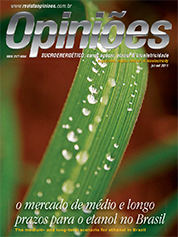Wagner Gonçalves Rossi
Minister of Agriculture, Cattle Breeding and Supply
Op-AA-29
Decisive moment
Markets of products derived from sugarcane show excellent perspectives. Without exaggerating, one can state that sugarcane is the raw material of the future. In addition to the importance of sugar as food around the world, of ethanol for fuel supply, and of the international market outlook, there is yet another contribution – electric power generated from bagasse.
Then, not to forget, there is the research and the discoveries in the field of ethanol chemistry and in the obtainment of other derivates of molasses. The problem is that, unfortunately, what is lacking is sugarcane.
Studies indicate that the country has already installed a crushing capacity of 130 million additional tons. One needs to resume investments to meet the objective of building 15 units per year, with a crushing capacity for about 4 million toneladas each. This is what is needed to reasonably meet the needs resulting from the growth of the ethanol market.
This is a sustainable market that affords the Brazilian society benefits. The industry is entrusted with responsibilities that place it in a priority ranking in the government’s development strategy and from the point of view of safety and national sovereignty.
One should therefore consider that much of its development depends on joint actions to be undertaken by government and private initiative. The market, aware of this huge potential, must act as the key to unleash the resumption of the industry’s growth. It is only with the confidence of the free market, within known parameters, that it will be possible to generatethe environment expected by investors in the long-term.
For this to occur, uncertainties must be eliminated. Legal insecurity too must be mitigated. Such decisions will allow ethanol to achieve higher profitability, and they will have to be taken by both government and private initiative.
One must see the sugarcane-based energy industry as a whole, to get the strategies right. Furthermore, the sugar and the generated energy from bagasse markets must be carefully assessed.
The profitability of companies that ideally should be professionally managed, preferably with publicly traded stock to access market funding, must consider the price cycles of different products derived from sugarcane. Such cycles do not always coincide, whereas if properly taken into consideration, they may represent the difference between investing or not investing in the industry.
Energy from bagasse has a positive impact and generates profit. Sugar, whose prices nowadays are lagging, contributes to supporting ethanol prices that as yet do not attract investments. Subsequently, such prices may be in a low phase, when the use of ATR (total recoverable sugar) in the production of ethanol more rapidly adjusts the market.
The government sees ethanol as a priority worthy of differentiated measures. However, in the case of sugar, it is of the opinion that the market should adjust it according to its conveniences. Therefore, the government prioritizes ethanol in public policies, without, however, taking any measure to adversely impact sugar, staple food around the world.
The quest for more agricultural and industrial efficiency and productivity is up to the industry itself. The government and the market must look to the automobile industry for increased efficiency of flex-fuel engines. It is up to the government to adopt important measures to diminish uncertainties, as well as to set new parameters for defining investment funds and tax matters.
All issues under the responsibility of the government will now be more easily discussed, albeit they are sensitive. President Dilma Rousseff has personally coordinated meetings of the ministers involved. She has already set some of the strategies, giving ANP (National Oil Agency) increased responsibilities and instructing the Ministry of Finance to look for ways to obtain more investments in sugarcane for ethanol production and the construction of new production units, along with more detailed studies on tax issues.
The industry has achieved a distinct status and its strategic importance has been acknowledged.
Among the most important mitigating decisions related to uncertainty is the percentage of ethanol to be added to gasoline, which should once and for all be definitively set, considering availability of the product and the future market to be supplied, while clearly indicating the fuel supply strategy to be followed in this market and even considering the possibility of importing, which would greatly contribute to the product’s internationalization and the attraction of investments.
This is so because the production of ethanol from sugarcane is much more efficient than of ethanol produced from other raw materials. Possible imports are not a problem in globalized markets. Actually, quite to the contrary – they operate as a guarantor of profitability and are an important parameter for investors.
By the same token, the uncertainty as to the criteria applicable to land ownership, a complex issue that should not inhibit investments Brazilian agriculture deserves and needs to adequately fulfill its role in world supply. The moment is decisive for resuming investments. The country is confident that it will build a favorable environment for the realization of the expected outcome.




